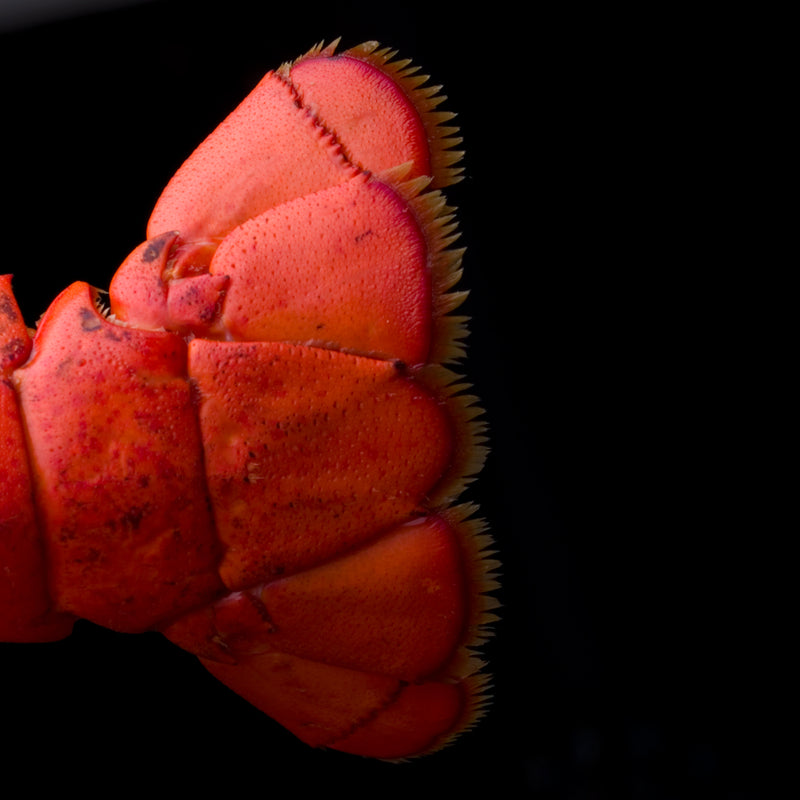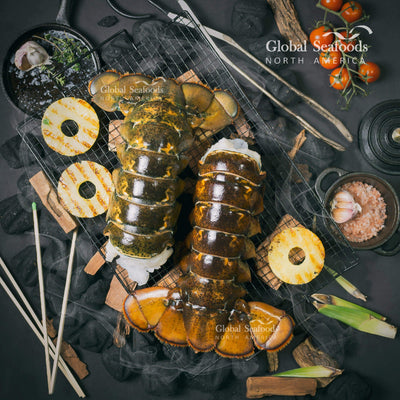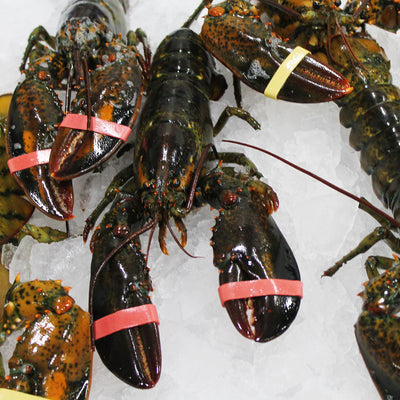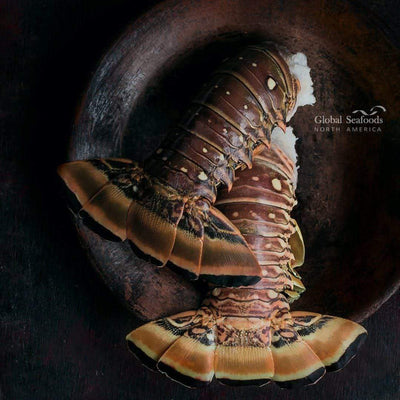The Ultimate Guide to Broiled Lobster Tail: Perfecting a Gourmet Seafood Dish

Broiled Lobster Tail
Broiled lobster tail is the epitome of a luxurious seafood dish—delicate, tender, and bursting with flavor. Whether you’re preparing a special dinner for guests or treating yourself to a gourmet meal at home, learning how to broil lobster tail can transform your seafood game. In this guide, we’ll dive deep into everything you need to know about broiling lobster tail, from choosing the freshest lobster tails to step-by-step cooking instructions. We'll also share insider tips and tricks to make your lobster tail tender and flavorful, just like at top seafood restaurants.
When it comes to broiled lobster tails, selecting the right type of lobster is key to creating a truly memorable dish. Cold water lobster tails are known for their sweeter and more tender meat, while warm water lobster tails can offer a slightly firmer texture. Whichever you choose, proper preparation is essential for a perfect result.
Why Broiled Lobster Tail Is a Must-Try Seafood Dish
Lobster tail is synonymous with gourmet dining, but broiling it at home can be just as rewarding as ordering it at a five-star restaurant. Here’s why broiling lobster tail should be on your culinary radar:
-
Ease of Cooking: Broiling is one of the simplest and fastest ways to cook lobster tail, making it an ideal option for home chefs. It requires minimal prep and allows the natural flavors of the lobster to shine.
-
Elegant Presentation: Broiled lobster tail is as visually stunning as it is delicious. Whether served with melted butter or a lemon-garlic sauce, the beautiful presentation of split, broiled lobster tails adds a wow factor to any meal.
-
Rich in Nutrients: Lobster is not only tasty but also packed with essential nutrients like lean protein, omega-3 fatty acids, and important vitamins like B12. For health-conscious diners, lobster is a great indulgence that provides nutritional benefits.
Famed chef Thomas Keller once remarked, "Lobster, when cooked properly, is sweet, succulent, and an unrivaled delicacy." Broiling is one of the best ways to achieve that perfect level of tenderness.
Types of Lobster Tails: Cold Water vs. Warm Water
When selecting lobster tails for broiling, understanding the difference between cold water and warm water lobster tails is crucial for achieving the desired taste and texture.
Cold Water Lobster Tails
Cold water lobster tails, often sourced from regions like Maine or Canada, are considered the gold standard for quality. These lobsters grow in colder environments, resulting in sweeter and more tender meat. Their firmer texture makes them ideal for broiling, where the heat can caramelize the exterior without overcooking the delicate meat inside.
Warm Water Lobster Tails
Warm water lobster tails typically come from regions like the Caribbean or South America. They are often larger than cold water varieties, but the meat tends to be slightly firmer and less sweet. However, warm water lobster tails can still offer an excellent flavor, especially when broiled to perfection.
To purchase high-quality lobster for your recipe, check out Global Seafoods' selection of cold water lobster tails or warm water lobster tails.
Step-by-Step Guide to Broiling Lobster Tails
Broiling lobster tails at home is easier than you might think. Here’s a detailed, step-by-step guide to help you cook lobster tails to perfection:
Ingredients:
- 2-4 lobster tails (depending on serving size)
- 4 tbsp butter (melted)
- 1 tsp garlic powder or 2 minced garlic cloves
- 1 tbsp lemon juice
- Salt and pepper to taste
- Fresh parsley for garnish (optional)
Preparation:
-
Prep the Lobster Tails:
- Start by thawing the lobster tails if they are frozen. To thaw, place them in the refrigerator overnight or run them under cold water for about 30 minutes.
- Use kitchen shears to cut down the top of the shell, from the base to the tail fins. Gently pull the shell apart and lift the meat, leaving the bottom of the meat connected to the shell. Rest the meat on top of the shell to create an appealing presentation.
-
Prepare the Butter Sauce:
- In a small bowl, mix the melted butter with garlic, lemon juice, salt, and pepper. This sauce will add incredible flavor and help keep the lobster moist while broiling.
-
Season the Lobster Meat:
- Generously brush the lobster meat with the prepared butter mixture. Be sure to coat all sides to ensure maximum flavor.
-
Broil the Lobster Tails:
- Preheat the broiler to high (around 500°F). Place the lobster tails on a baking sheet lined with aluminum foil or parchment paper.
- Broil the lobster tails for 8-10 minutes, depending on their size. Keep the oven rack about 6-8 inches from the broiler. The lobster meat will turn opaque and slightly brown when it’s ready.
-
Serve and Enjoy:
- Once broiled, remove the lobster tails from the oven and brush them with any remaining butter sauce. Garnish with fresh parsley and serve immediately with lemon wedges or additional melted butter on the side.
How to Serve Broiled Lobster Tail
When it comes to serving broiled lobster tails, simplicity is often the best approach. The rich, sweet flavor of lobster pairs beautifully with:
- Melted Butter: Classic melted butter is a must-have accompaniment for broiled lobster tail. The richness of the butter enhances the lobster's natural sweetness.
- Garlic-Lemon Sauce: For a fresh, zesty option, try a garlic-lemon sauce made with olive oil, garlic, and freshly squeezed lemon juice.
- Vegetable Side Dishes: Serve broiled lobster tail with light, seasonal vegetables like asparagus, broccoli, or a fresh garden salad to balance the richness of the dish.
Sourcing the Best Lobster Tails
Finding high-quality lobster is the key to making any lobster dish stand out. Whether you're looking for fresh, live lobster or pre-packed tails, buying from reputable suppliers ensures you're getting the best product.
Global Seafoods offers a variety of lobster tail options, including cold water lobster tails and warm water lobster tails. They also provide other premium lobster products like lobster claws and live lobster, all shipped fresh to ensure maximum quality.
Expert Tips for Perfectly Broiled Lobster
-
Use Fresh Lobster When Possible: Fresh lobster tails tend to have better texture and flavor than frozen ones. If you can, opt for fresh lobster tails from a trusted supplier like Global Seafoods.
-
Keep an Eye on Cooking Time: Lobster tails cook quickly, so make sure to keep an eye on them while broiling. Overcooked lobster can become tough and rubbery, losing its delicate texture.
-
Butter is Your Best Friend: Basting the lobster meat with butter during broiling ensures it stays moist and enhances the overall flavor. You can also experiment with herb-infused butters for extra depth.
-
Know Your Lobster Source: Sourcing from reputable suppliers ensures you’re getting lobster that’s sustainably harvested and of the highest quality. Buying from companies like Global Seafoods gives you peace of mind knowing your seafood is responsibly sourced.
FAQs About Broiling Lobster Tails
1. What’s the best type of lobster for broiling?
Cold water lobster tails are generally preferred for broiling due to their sweeter, more tender meat. However, warm water lobster tails can also be delicious when cooked correctly.
2. How long should I broil lobster tails?
Broil lobster tails for about 8-10 minutes, depending on their size. The meat should turn opaque and slightly golden brown when ready.
3. Can I broil frozen lobster tails?
It's best to thaw frozen lobster tails before broiling them. Thaw them overnight in the refrigerator or run them under cold water for about 30 minutes.
4. What should I serve with broiled lobster tails?
Broiled lobster tails pair well with melted butter, garlic-lemon sauce, and side dishes like roasted vegetables, mashed potatoes, or a light salad.
5. How can I tell if my lobster tail is done cooking?
Lobster tail is done cooking when the meat turns opaque and white throughout, and the shell has a bright red color. The internal temperature should reach 140°F.
6. Where can I buy high-quality lobster tails?
You can purchase premium lobster tails from trusted seafood suppliers like Global Seafoods, which offers a variety of cold and warm water lobster products.
Conclusion
Broiling lobster tails at home is a simple yet impressive way to serve a gourmet seafood dish. With a little know-how and the right ingredients, you can recreate restaurant-quality lobster in your own kitchen. Whether you're using cold water lobster tails for their sweet, tender meat or trying out warm water lobster tails for a different texture, broiling brings out the best in this luxurious seafood.
For more lobster recipes, seafood tips, and sustainable sourcing practices, check out Global Seafoods' YouTube channel.
Also in Recipes

How to Cook Live Manila Clams at Home: Fresh, Sweet & Delivered Overnight
Discover how to store, clean, and cook Live Manila Clams at home using simple chef techniques. Learn why these Pacific clams are perfect for pasta vongole, steaming, chowders, and more—plus how to order them fresh in a convenient 10 lb bag shipped overnight.

Boiled Crab for Brunch: The Ultimate Guide to Morning Seafood
Discover the joy of Boiled crab for brunch! Learn how to prepare seafood in the morning, its health benefits, and recipes to make your brunch memorable.




